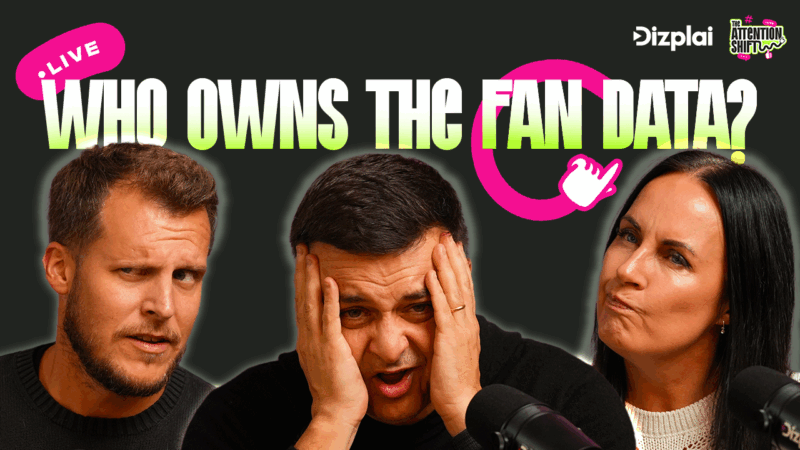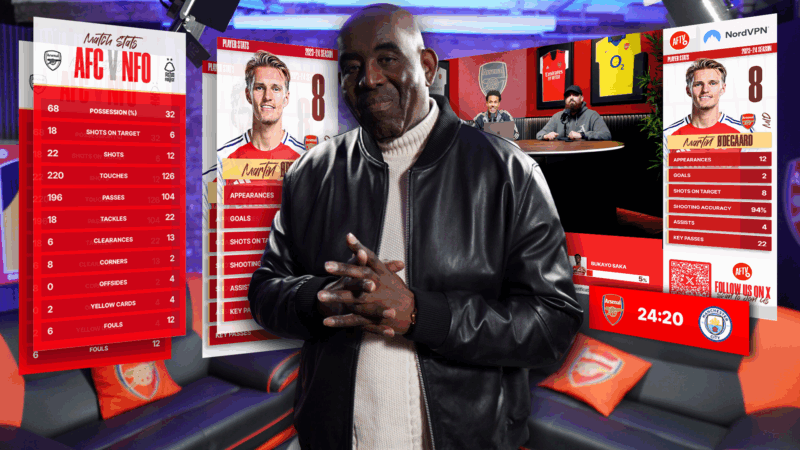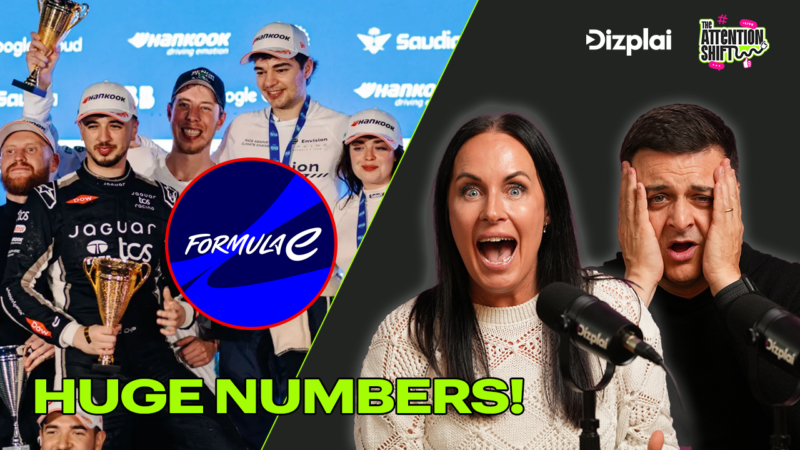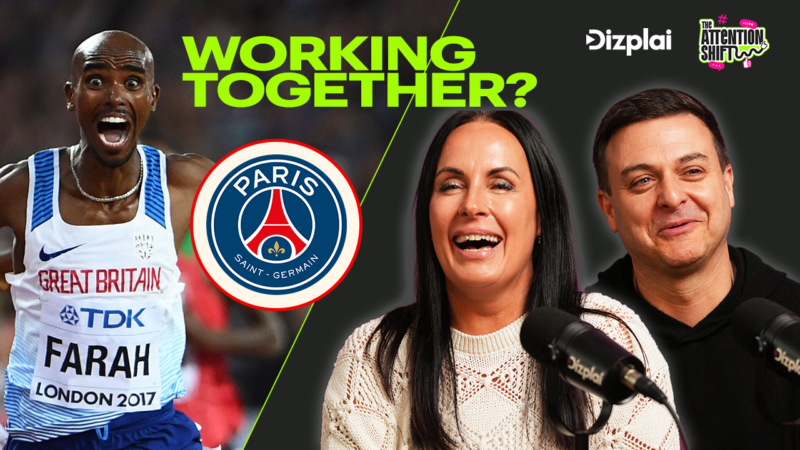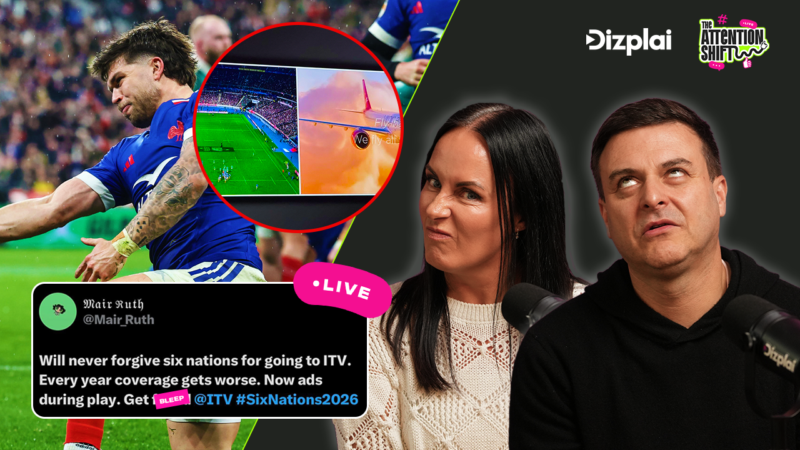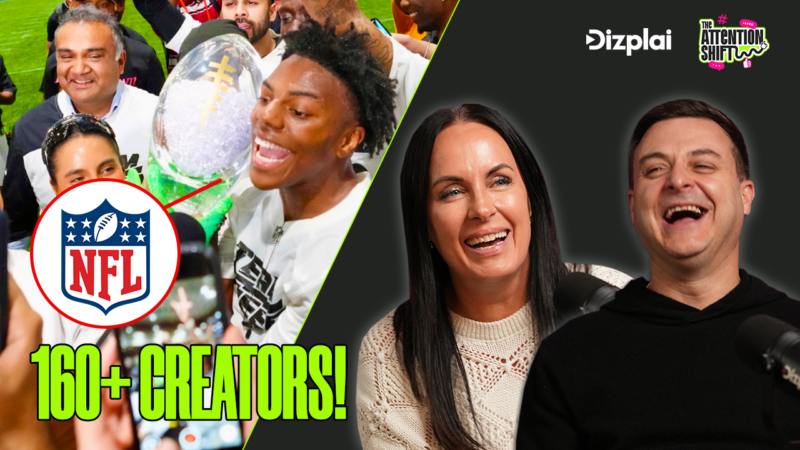
Summary
- Data ≠ Relationship: Owning fan data doesn’t equal owning the relationship; value is judged on data quality.
- Catch-Up Mode: Sports organizations are belatedly prioritizing fan data as their top growth driver, playing catch-up on collection.
- Motive Check: Is the data focus truly about improving fan experience or merely an opportunity for monetary extraction?
- Unifying Data: Fragmentation is rampant; most organizations need to implement single sign-on to build a single fan profile.
- The Value Exchange: Fans will share data only if there’s a clear return, demanding better, personalized service.
- Listen to the Fans: Organisations must utilize comments and social platforms as live focus groups to gather actionable feedback.
Transcription
Welcome, guys, to another episode of The Attention Shift.
I’m Lee Radbourne.
I’m Ed Abis.
And I’m Jo Redfern.
Well, we’re back again.
I know. Got the gang back together.
Ed, you’ve been away on an odyssey,
a trip around the US.
My deep self-trip around the…
And I survived.
And you made it back without getting arrested.
Yeah. And no Trump hat either.
Win-win.
So what are we talking about today, Lee?
This week, I’m mostly talking about
who owns the modern sports fan.
So what we’re really talking about
is who owns the modern sports fan data.
So whoever owns the data owns the fan and owns the money.
So some interesting stats for you this week.
73% of the US adults watch sports,
which obviously is massive data uncaptured.
And also 40% of fans use team and league apps for info.
35% for live updates.
Again, completely untapped and disjointed.
So we’re really gonna try and talk about
who currently owns all this data,
what it means for you as a club or a league
or a federation, and how do we make it better?
How does it improve the fan experience?
But also, obviously, hopefully monetize it better
for people who are trying to own it.
Okay. I have thoughts.
Yeah.
Good, that.
I’m gonna get comfortable.
Well, no, I’m gonna answer your question with a question,
which is not what you should do.
But given that data is so important,
and there is a huge focus on it, and rightly so,
a couple of things come to mind for me.
One, if only now are sports organizations saying
data is a big growth driver for them.
Well, why only now?
It’s 2025, and it feels like a lot of them
are playing catch up.
Why?
Because I think they’ve been more than happy
to shove the responsibility for that fan relationship,
and therefore data gathering,
to whoever builds their apps,
to whoever builds their websites, to their broadcasters.
It’s been too long that they’ve been quite happy
to let somebody else think about that.
And that, it feels like it’s coming back
to bite a lot of sports organizations on the bum.
Similarly, when we’re talking about data,
why is the data now so important?
Is it important because they’ve realised
they need to improve the relationship with their fan
or is it another opportunity to screw them?
That’s two things that come to mind.
Go on, I can see you’ve got two.
She’s jumping in.
Just remind me of the first question again.
Why only now is the focus on data?
I mean, let’s face it,
we’ve had the ability to track data
for a little bit longer than,
Meta are pretty good at doing it.
So why now is it so important in 2025
that another stat, 70% of sports organizations
say Fan data is their number one growth driver?
Why now?
I don’t think it’s only now,
but I just don’t think
they’d potentially be doing a great job of doing it.
I mean, if I hop back to my days
working in a football club,
we were, and again, we were putting CRM systems
in the cable, CRM system that’s gonna fix everything,
and it never does, right?
Because you’re not really building a view of the fan.
And in general terms, I think a lot of the time
these things were getting built to ultimately work out
how do we monetize them more
rather than how do we service them better.
And I think you would hope now
that if people are saying that this is a priority
because they wanna service them better,
not just monetize them.
Because I think if you service them better,
it’s a value exchange, right?
They will spend more money with you.
And I think that’s always been the challenge.
And it was always like,
well, if we have more data about them,
they’ll just spend.
I was like, no, because a lot’s gone on
over the last however many five, six, seven years
and what happened with Cambridge Analytica
and first because it was now Meta,
and the fact that a lot of data
was being collected on people
without them realizing what they were giving it for.
I think people are now hypersensitive
to handing over their data.
But I think, I know they will part with information
about themselves if they feel like
they’re getting something in return.
If they feel like their opinion is being acknowledged.
I guess that was, yeah,
that was my point about the motivation.
What’s the motivation for the hyper-focus on data?
Is it really about improving that fan experience
or is it another extraction opportunity?
And that’s a balance that needs to be struck, right?
I think historically, if you look back,
you were relying on media deals, right?
And we’ve talked about media deals extensively
previous episodes.
I’m sure we’ll continue to talk about it
more in the future
where you didn’t have an incentive, right?
You were just giving a big check
and go, thank you very much.
And you didn’t really care too much
beyond the data.
You wanted to have a relationship with your fan,
but there was always,
it’s kind of a unique relationship per channel,
if you like.
So I want to know you as a Burnley season ticket holder.
Yeah, great.
I want you to renew your season ticket,
but I don’t know you historically or even now today.
I don’t know you, Ed,
as your season ticket holder,
but you also brought the shirt in the store
or that you engage on YouTube
or you engage on Facebook
or whatever platforms that you engage with.
Data has always been the most important thing for fans.
And also for people to own
because that’s where the money is.
And especially in an AI world,
I think now more than ever,
it’s about delivering that sort of
hyper-personalised experience
that ultimately what you want as a fan
is a targeted ad that says,
“I know you own the home shirt for this player.
Here, they’ve just scored a goal.
If you buy it in the next 10 minutes
or you go down to the club shop,
you get 50%.”
And that’s the dream,
but I think we’re all used to bad experiences.
And now with other challenges like cookies going away
and trying to consolidate all these fragmented databases,
if you like, going back to your CRM point,
it’s actually very difficult to do that.
That’s the problem, isn’t it?
Those systems historically haven’t spoken to one another.
Therefore, we’ve all had those emails
or those messages where you’re like,
this doesn’t feel like it’s talking to me.
Do they not know me at all?
Oh, you get it twice, right?
Or you get it…
Yeah, exactly.
So how do we go about unifying that then?
Because what you’ve essentially said is
we’ve got a series of separate relationships,
but actually when it comes down to it,
there’s no cohesive overview of who Ed is as a fan
or who Lee is as a fan or who Jo is as a fan to say.
But that in and of itself optimises
the chances of monetising that fan
in a way that makes sense
and actually in a way that they’re going to be
feeling like they are getting that value exchange.
Because otherwise it’s just like,
okay, we know this about you over here.
You do this at this time of day on this platform.
Here, do more of it, please,
and pay more for it.
I mean, the way I’ve seen it play out over,
let’s say the last 10 years
when we’ve seen the rise of social networks
and video distribution platforms,
and obviously we still have linear broadcasting
or OTT broadcasting or whatever variant you want to look at is that obviously rights holders give up their content and then totally lose control over the narrative of that content. What they need to be doing now is, because you’ve seen it more and more now, right? When you get outside of Premier League and maybe a few other sports, most other federation tiers are ultimately giving their content away for free now to get that reach in linear, because there’s an ad world that still really, really, really cares about that number. But if you’re giving away that content for free, you need to start to integrate better marketing into that content and start telling the story about your sport and the inner workings of your sport and getting the audience to help you to shape that editorial narrative of that content too, because they want to, right? We see that with creators. The creators open up that door and welcoming the fans and the fans absolutely want to help shape the content. That was going to be my point about creators, because it strikes me that they’ve circumvented a lot of what sports organizations and leagues should have been doing. We’ve spoken before on this podcast about disintermediation. You’ve got creators who are owning the relationship with fans because they’re going to direct them on YouTube. They arguably are much closer and know their fans a lot better than a lot of leagues currently. Do you know who’s really good at this? I’ve been good at this for decades, radio. Like radio have always spoken to the listeners, always solicited opinion constantly, because they know that that kind of medium actually needs it. And in a lot of ways, when I look at what creators do, they’ve taken it from the playbook of what radio’s done, but because it’s video, it gives them an ability to do things. I’ll play devil’s advocate to you on that though, Ed. I’d say like radio doesn’t necessarily matter as you as, yes, they know who you are as an individual and they recognize you. It’s more throwaway. Yeah, it’s a very like, it’s a disposable interaction in essence, right? Because it’s like, they care about you for that five minutes of fame or talk or whatever competition you’re failing in for. I think there’s some, when you’ve got all these siloed data points and I think it came down, ultimately the first question is why is it taking so long? One, money and laziness. Yeah, expertise as well, expertise. Expertise, yeah, it’s competency isn’t it? I think it’s hard because you’re in that, like you’re getting, I’ve been there, you’re getting pitched all the time about this product and service and this product and service and this product and service and you know what you know in your job, you ultimately pick something and generally speaking, there’ll have been a commercial discussion that’s driven you down that path, which doesn’t necessarily mean you’re getting all the information you need to make the right decision. And I know that from me starting out, and I think look, football clubs have progressed a lot more now. When I started out, I didn’t really have any formal training. I started as an office assistant and sort of learnt on the job. And I was speaking at a football league event recently and to all the different clubs there and as I said to them, I know in your job, you’re beg stealing and borrowing because you don’t have a lot of resource and you have unbelievable expectation in terms of what you’re meant to do to be able to communicate with a fan through all these different mediums to say to them, oh, can you make sure there’s attribution here while you’re doing that and make sure that it, they want to, but they’re just. It’s definitely an inverse relationship between kind of scale of organisation and their ability to be nimble and join those dots because that brings me back to creators. Creators, again, we’ve said before, they’re self-shooting producers, directors, they’re analysts, they upload their content themselves, but then they look at where they’re losing audiences and then they iterate the content. So they do five different jobs. But also they are quite transactional as well in terms of. They listen to the audience to make sure they share their content. But it’s based on that. But it’s based on that. But now I’m seeing it more and more with some of the creators that we know that now they’re thinking, this might not last forever. How do we build a business model? We have to start acquiring data and understand more about our fans. Yes, and do it across different platforms. But the difference is if you think of a creator, a creator has much easier tools available to them. Like the insights you’ll get off a fan of YouTube because you have to be logged into YouTube or at least you’ll have to sum, if YouTube will have enough information about you or any Meta platform or any platform that, you’ll get a lot of insights and analytics around your audience. And you can really dive deep into who’s spending the most time, what demographic, really do that because of the platforms that you’re using. If you’re a club or a league or a federation, you don’t, and you’re only just coming to, let’s say YouTube or you’ve had some stuff on YouTube, you’ve got all this historical data from, however, maybe a hundred years worth of fan base that you’ve got. The challenge is, is that when I say laziness, it’s because you were never incentivized to do it because sponsors would give you money based because you’d say your shirt would be your logo on your shirt or the billboard on the stand would be seen X amount of times. You know, you get media money from people going, oh, we’re just gonna give you money because you’re gonna get a rights deal. Those two things have dried up. Sponsors now expect more. Sponsors want to see a return on their investments. So they don’t want, they’re no longer saying- I think sponsorships are now, it was interesting because it came up at Leaders recently where within half an hour of me arriving, I think I’d had four conversations where the general consensus was that the sponsor market’s on its arse, as someone said. And I look at that because, because I’ve seen it time and time again, and look, there’ll be people that will no doubt in the industry will push back and say, well, we’re really good at that. They’re just not very good at activating sponsorships. Like sponsorships, and also I think sponsorships for a long, long time were, was a badging exercise or someone did it because they were interested in that club league or federation. And actually this should be performance-based. Ultimately it should be performance-based. But that’s what’s changed, right? And now you’ve got these things. So there’s a great, there’s another great stat. Only 32% of sports organizations have single sign-on, right? So you know, these data capture opportunities where you’ve got these silo teams who are incentivizing and whether it’s your season ticket team or your marketing team, you’ve got different things. All this silo data, you have to combine. And once you combine, and especially in an AI world now, as if you really want to advance your hyper-personalization or really utilize the benefits of AI and do something really clever, having all this, you’re going to have to put your data in one place. So I think that’s the challenge. So do you think we’re saying then that leagues or rights owners need to start caring more about data and maybe lobbying for more control and ownership of it? Because it strikes me that they’ve had, they’ve been happy to kind of give data to all of those multiple claimants, to the broadcaster, to the sponsor and go, it’s fine. But now actually they’re going to have to have someone saying, no, we need to either get access or keep control. Exactly, or rent it back and stuff. So unless you’ve got your own OTT platform or you’ve got your fan app or you’ve got your website, there’s lots of different touch points, but you have to know that relationship. You have to understand, with all this attention that you want, it’s that timely message around, don’t get seven emails saying the same thing. Or like we were just example weeks before, “we know you’ve got this home shirt for this player.” “Actually, we’re going to incentivize to buy their own shirt.” “Or we’re going to do, we know you always go to this game with your family.” You can’t do that without understanding, having the data in the first place to do it. And what you’ve done historically is you’ve given it all away to your broadcasters. Now you’re giving it all away to, in essence, YouTube. Luckily, YouTube is quite good at giving some analytics back, but that YouTube analytics data is still not going to link to your fan data that you’ve built in your marketing database. So how do you combine the two? You can combine them, but that data ownership point is really interesting to me because it has to start there because if you, data ownership doesn’t equal relationship ownership. No. But if you can show that you are getting to know your fans, then they’re more than likely to pay per view your next boxing match or attend your next game. The two aren’t mutually exclusive. They’re linked, but you can’t say that data ownership equals relationship ownership. No, I think part of the reason that people feel so fleeced all the time is because everyone always talks about, one, they call them users, not fans 90% of the time, if you talk to them. Consumers. Yeah, or consumers or users. It’s very rare, even in our industry, there’s not enough people calling them fans. It’s not the first thing someone says, they say users. Then you’re trying to sell to them all the time, but then you’re like, well, I’ve just brought the home share, and now you’re full for full price when it got released on the first day. Yeah, that’s my point. That’s not a relationship. And now you’re sending me a 30% offer. I think what’s important, I mean, I truly believe that business of the future are gonna be judged on the data they own, the quality of the data, rather than their turn-off. Look, turn-off is obviously gonna be important, profitability, but ultimately the value of that business is gonna be judged on the data, the quality of the data they own. And I think there’s a lot of people now that have realized this and have started to see this, hence why there’s now this scramble. And I think the way that AI now, I think more and more people are now really delving into how they use AI to do this. And we’re getting past this almost like, let’s just use AI for everything. People are realizing now that you can build large language models that are gonna help to ultimately drive a lot of this data acquisition. I don’t know, you’ve got an interesting thing. I’ve got a senior interest story if you’re off that. So yeah, so the class example, which is used for case study for a very long time, is when Spotify did a deal with Barcelona. Barcelona went to Spotify and went, we’ve got a billion fans worldwide. Spotify went, brilliant, show us. And they said, oh no, we’ve only got 300,000 in our database. And because of that, the deal actually ended up doing round, report about 310 million US dollars, instead of being a billion dollar deal because they couldn’t prove that they had a billion fans worldwide. There was a massive incentive there for Barca now to go, well, actually we know the metric and we know what we’ve got to work at. Now that might need a real thing about hiring, right? And the team and the type of people that you need and you’re going to get more and more data analytical people. And again, we’ve been having a conversation about this as well ourselves as a business, because we are working towards being more analytical, more data orientated, but you’ve got to be careful. Because a lot of the time, if you just made decisions based on data analytics, no one would ever do anything new. Because most things don’t at all. You’ve still got to be creative as well. So again, it’s finding that balance. But the data and analytics ultimately should be there for you to ultimately tell you what’s happened in the past. And ultimately then trying to help you make a decision on what might happen in the future, but you’re still going to have the creativity with it too. Well, like we talked about in the Netflix episode, we talked about how Netflix has such good insights based on the data that they get from that. So I think you talked about it, Jo, previously, which was, well, they sign you up for this one-off Mike Tyson fight. Yes, the breadcrumb strategy. Yeah, the breadcrumb strategy. “Oh, by the way, when you’re just about to think about cancelling, then you’ll do the NFL on Christmas Day.” We’ve talked about this before. And especially in the AI world, they say data is a new oil. That’s the phrase that’s commonly used. And I think- And Netflix use YouTube and even Roblox for data. Let’s not forget that. They don’t just concentrate on their own OTT offering. They have YouTube, several YouTube channels. They use a lot of content. They’ll premiere stuff on YouTube, particularly where younger audiences and kids, they’ll put first episode on YouTube because they know that’s the first platform for younger audiences, and then put the rest on main platform. But they do it on Roblox too. They’ve got Netflix Next World, where they drop in One Piece, they dropped in K-Pop Demon Hunters as a way to engage audiences there. But they’re getting data there too. It’s not all proprietary data from Netflix platform. So I think it’s a good time to go to quick fire questions now and see how we answer that.
Hot Take Huddles: Who Should Own the Data?
So the question is, who should own the data? Jo, I’m gonna let you go first. You’re gonna get two minutes. Who do you wanna pick as owning the data? I’m going fan. Fan. Fan all to the outside. Lee’s gutted because he really wanted to go fan. So two minutes starts now. Okay. Fan data. Data sovereignty, I think, is something that I feel really passionate about. Because this podcast is called The Attention Shift, the very essence of talking about The Attention Shift was the shift in power from who used to be the channels and those who owned either the rights owner or the broadcaster basically owned the relationship with the fan and they dictated how they consumed sports content. Now in this era of fragmented fans, basically endless content, the power has shifted to the fan, to the audience, those with eyeballs whose attention that we want. Therefore, I think the power has also shifted to them, which means we have to be in service of the fan. So if their data is sovereign, we need to ask them permission for it. And that implies we need to work hard for it. We can’t just assume fandom happens. We need to work for that. So basically what we’re saying is that, or what I’m saying is, is data is sovereign. 30 seconds. Therefore, you can’t assume as a league or a club or a rights owner that they’re just gonna give over that data willingly, or in fact, you own it. Which means that it shifts the onus on actually satisfying the fans with a good product and a good experience is moved back into the realms of those, either the broadcasters or the leagues of the rights owners. So for me, data sovereignty, and as we move into kind of blockchain and Web3 data will become sovereign, I think that’s who has to earn the data. So actually you got another 30 seconds, I got that wrong. I reckon I’m done. I’m done. Data sovereignty. We own the data. So you’ve got to work hard to make us hand it over. Okay, I’ll give you that because I actually ruined the time before that’s totally my fault. Thank you, Jo. Good answers, Jo, by the way. That’s definitely not what Lee would have said. No, no, no. Lee Radbourne, over to you. Who do you think owns the data? Two minutes, starting now. Well, it seems as I have to take the other side. I think the businesses should own the data. When I say business, I mean the sports, club, organisation or federation. And the reason why is because if you want true innovation, you need to do that. Henry Ford once said, if they asked people what they wanted, they would ask for faster horses. Didn’t he say like a black calf? So by the clubs and the federations own the data as we were talking earlier on in the episode, it allows them to have a 360 degree view of you as a person and will understand you more than you will understand yourself, which means that you can get hyper-targeted experiences, which means that it becomes seamless, almost like a Jarvis Ironman type experience where it knows what you want before you get there. And by them owning it, it allows them to do this type of innovation and work with the best technologies and the new technologies that are coming out. If the fans own the data, as we already know, people already opt out of cookies. So something like 35 to 60% of people already opt out of cookies, which already makes that only understand the fan even harder. So if you’re not, if the fans don’t want to give up that data to allow you to, which I would argue, Jo, you’re right, but if they don’t want to give that data up to you, then you can’t then truly innovate because you don’t understand who they are. So with that, that’s why, how long have I got left? 48 seconds. Oh, good. That’s why I do. You’re winning me over. I think we need to move into a minute. You’re winning me over, it’s good. Yeah, yeah. But I think that’s the point ultimately is, to truly innovate, you need to have the data and you need to have the insights and you can’t do that if the data isn’t readily available. And if anything, you should have more data sources coming from them. So actually there should be more collaboration between league clubs, federations and technology partners to enable people to have that better understanding of you as a fan because ultimately it will service you better. You know, the other example is, if you think about Amazon, if you buy a sofa on Amazon, it keeps recommending you some more sofas. So it’s like, well actually, if they knew more about you, they’d know you actually don’t need another sofa. So the same applies to sports. So let them own the data so they can make you a better fan experience. Nice. Thank you. Well, I mean, you got close to two minutes. I think we definitely might have to tweak the time. Yeah, maybe a minute. It feels a long time for me to sit here and say nothing. Mainly. I’m gonna go with Lee Radbourne. Sorry. That was compelling. Yeah, it was compelling. It was. And not that yours wasn’t compelling. I just, I quite like the way he structured the argument. I quite like the way he gave a sense that the organization has more ability to ultimately shape the narrative with the data. Okay, allow me one comeback. Allow me one comeback because we’ve already spoken about this on the podcast. This pursuit of ownership by all of these different parties who are making calls on data, we’ve already said there’s a problem with fragmentation. So again, we’ve got a bit of a paradox here. The more data that everybody owns, those businesses, the more fragmented it gets and actually they know they’re fanless. Okay, so look, we’ve talked about the challenge. We’ve talked about some of the issues around doing this, where the opportunities are in essence is how do we now recommend what would we do around this in terms of capturing more data? We’ve talked about how valuable it is. What would you do Ed?
Unlocking Fan Data: A Practical Strategy
I think, I know, I always say, I think, I know. There’s a top of the funnel play before we get into any of the specifics of how we actually want to activate any of this acquisition of data and how we want to store the data. And from my perspective, I look at any sports organization, it’s they need to start creating content more in a way, I’m not saying like a creator, because ultimately they have a different way of making content, but think more about how creators involve the fan in the content that they are making. There’s nothing wrong with how a, necessarily how a media company takes your live event as it is right now and then broadcast that out, right? That’s still gonna exist for me, but we live in a fragmented world. You now have the opportunity to own the distribution of your own content and own media in a way that wasn’t possible before. Start creating content that ultimately considers how the fan is gonna interact with it in the moment. And ultimately then that’s a way that you can start getting them to share their data to be part of the experience. Yeah, I think driven by the point you made, driven by broadcast, it used to be that your one broadcast had to satisfy all the fans. That was your only window. Yeah, yeah, yeah, everyone. But as creators have identified, they can satisfy a niche. And we know that some, Juve has got its creator lab. So it started acknowledging that actually there’s different types of personalization of that core content. But you’ve got some fans that want to have that overlay because they wanna understand what the shot probabilities are. You’ve got others who just wanna be entertained and see the drama of the Ryder Cup. Well, now we have the ability to do all of those things. It doesn’t necessarily have to be in the main broadcast. This is your business. You can create those different streams, feeds. You can do it on YouTube. You can do it on OTT apps. So I think if we flip it, and I know I always come back to you, let’s stop thinking about the fan as potential data to be captured and think about how are we gonna make them hand it over willingly? And then that flips the script, doesn’t it? You think about, okay, those fans that do want the shot probabilities, how can we service them versus those who basically want the drama? Well, actually we can do all of that. And then all of that data needs unifying. That’s a problem. Well, I think that you’re right, Jo. So it’s incentivizing people to want to have a relationship with you as a club or a federation. But then how do you unify it? That’s one that I’m not too sure on. It feels like there’s lots of different strings, but nobody’s really pulled them together yet. I think the simplest way to start unifying the experience, if you like, for a fan is with looking at single sign-on, right? So if only, I think it’s a great start. One in three sports organizations have single sign-on. We’re now all used to it. Whenever you try and log in, the first thing I do is say, “log in with Google” or “log in with Apple.” And it allows you to do that. And if you can do that across all your platforms to have one unified login experience, whether it’s on your ticketing site, whether it’s on your website or other activities. And you could do that with some quick wins, link app registration to Wi-Fi access or prediction games. So you start capturing people. OTT platforms have done this for a long time now, iPlayer, ITV Player, et cetera. I think that’s step one. Step two, then, is to then to turn these apps into data entries, what you were talking about, which is using these types of activations to build it. And what you say about content creators, which is create those interactive moments and create those experiences that actually then make you want to engage. And that allows you then to build that profile around this person, the more they interact, the more they do. There’s a multitude around there, because like, yeah, look, these simple terms of, you know, we’ll always talk about polls and quizzes and commenting and opinion-based things and things like that. But also giving timely retail offers based on an action that’s happened. Yes, generates your revenue, but also that’s data points for you as well that you can then build on. I don’t see a lot of that happening where sort of in the moment. I remember I used to do this kind of stuff years and years and years ago when it was all manually based when I was at Burnley, where, yo’know, around betting, around buying merch, you know, we’d make sure that as soon as we’d won a really important game, you could, as it was then, buy the VHS. Now you do it in a totally different way, right? But the mechanic is totally no different. There’s not a lot of that. And I think the sports organizations don’t do a lot of them themselves. And I don’t think it has to be a costly thing to do it. Yeah, I agree. It feels like a lot of data is perceived as an overlay. It’s a sprinkle on top. Whereas if you do it right, it can be much more foundational. I agree, yeah. I wanted to just bring up, because I mentioned before about Web3 and blockchain and that does underpin that data sovereignty because then it’s, your data is soul-bound. It might be anonymized, but actually that allows a much more cohesive picture of a fan rather than, oh, we’ve just got their email address and their purchase data. So I think that it’s a way away yet. The technology exists. The adoption is a bit of a barrier. I mean, let’s face it, a lot of these platforms, their trade is in data. So it’s not within their interest to open up and make everything open. But I do think that at some point, particularly with, again, most of my experience being with younger audiences, they’re so keenly aware of their data and how it’s used, much more than previous generations. So I think we’ll see much more of this data sovereignty and being more selective about where they’re gonna deploy their data and they’re gonna demand something back. Yeah, and that’s the reward in the relationship. But I think for- It’s a value exchange, isn’t it? But I think if you’re a business, there’s an incentive to do this apart from all the stuff that we’ve talked about. If it was a $115 billion sponsorship market and the people who write the biggest checks are gonna want the most insights. So if you can package your audience insights on who engages and how and when and prove the ROI, there’s a real incentive to do that. And then ultimately, you could do it as data as a service, right? You could then license your data and all your insights out to sponsors, Well, if you’ve got behavioral data at scale, that’s gold mine, right? Well, ultimately, then you ultimately, as the rights holder, you’re then choosing the brand you wanna work with based on the insights that you’ve got from the data that people are giving you. And then let’s make a point about new platforms as well. I mentioned the R word again, but if you’re thinking about Roblox, there’s a lot of sports rights holders that are not reading the signals there. Again, data, there’s data there, but they tend to focus on a small number of platforms that they’ve got a relationship or that they know. And we know that particularly younger fans live their lives across many more platforms. There’s whole swathes of data that’s not being read. So spread your data collection if you really do wanna get to know your fans across many more platforms. And then that picture starts to become much more colorful. I think that’s maybe a knowledge gap as well. We were chatting about this earlier, weren’t we, off camera about Roblox. And I think you think now like Reddit, right? Reddit‘s been around for ages. Now you’re starting to see sports organizations and I’ll pick out one, not because I’ve got any particular insight, but Arsenal are now hiring someone who’s gonna look after their whole strategy around Reddit internally within the business. Because they’re starting to see now as a platform that it’s starting to get some kind of traction. It was there before, but I think it was more almost like, “underground” is not the right word, but it was happening in the background almost. It wasn’t interlinked into. It’s the eighth most visited site in the world. And you see more orgs now and I was seeing, ah, actually maybe we need to lean into Reddit as a platform though. We need to be engaging our audience. And Reddit and YouTube comments, again, talked about, I enjoyed reading the YouTube comments on Baller League as much as watching the actual action. It was a live focus group on who was tracking, on how they were enjoying the football, on which teams were most popular. Reddit is similar. It’s a living, breathing, organic quality focus group. I was just gonna make a point on YouTube comments, whether that’s live comments or whether that’s comments on a video. I’ve just bought a new car and I’m not gonna plug the car I’ve bought, but I wasn’t sure about buying the car because it’s a new entry in the market. But every single review I saw on YouTube under all the different videos I watched were positive about the car. And it actually reinforced for me, it wasn’t the only reason I bought it, but it reinforced, ultimately then people sharing data has reinforced my decision-making on buying that car. And that’s ultimately what we’re talking about is creating those relationships that you get. Ultimately, if you could get user-generated content into your own cell phone platform, whether that’s an OTT platform that you own yourself, if you’re lucky enough to own, that’s a club or a federation or a league, or even just on your club’s website, is if you can start getting people to upload content and really building those relationships and getting that feedback, that’s what’s really gonna drive that engagement and that data. Yeah, I mean, that was just the perfect example of what this whole episode’s been about. Rather than your data having been captured, well, they’ve captured some data about you because you’ve bought the car. But actually, if the car owner or the sports club or the organization or the league thinks about humans as fans who are making choices, then again, we come back to the value of that data increases because that increases that you’ve chosen that car because of humans sharing their ability. And interestingly, not because of dealership because the people who get the reviews on the car and the videos that I saw of independent people who are not linked to the car did a better job at selling me the car than the dealership itself who didn’t give me that depth of information. Yeah, humans sharing their experiences as influencers to buy the car. So I bought it despite the dealership rather than because of the dealership. Is that a great analogy for what we’re talking about, which is like, isn’t the club at the moment is like the car dealership where you kind of feel a bit like they’re trying to sell me something, they’re trying to sell me something. And actually, what you want is that, you wanna buy the car or you wanna have that relationship with the club because you’re a fan. But ultimately, it’s the people around you, the recommendations that do it. And it’s the other data that gave you the insight. And actually, you don’t wanna feel like the club’s treating you like a used car salesperson, which it kind of sometimes feels like you do it, man. I don’t know any of those people that drop those reviews, right. And I looked at a lot of them, because again, I was unsure. So to wrap up then, because we have been talking for a while now and Will’s really challenged us today. If you have to give one piece of advice then to any of the organization that potentially listen to this podcast in terms of how to acquire, manage, benefit from the data, what would it be? Fans can still make choices. Therefore, anything you collect from the fan in terms of data has to be that value transaction. They either get something back or you use it to make the experience better. And coming back to fans as being humans that are capable of making choices, you chose one car over another, for me then just frames what data is collected, how it’s collected and how it’s used. For me, I worry that sometimes if data is the new oil, it’s just about how much can I get per barrel. I think that’s it, I think on a practical level that it’s gonna take a bit of investment to unify your data, creating a data lake to do that. You could do some simple things like single sign-on, like actually anything that has, you own zero or first party data initiatives like polls or email marketing or anything to do that. But once you’ve got that to Jo’s point, make sure you use it effectively, which is make sure it’s personalized, make sure it feels like you understand them. And ultimately there’s a capturing point and then it’s the understanding and the insights that make the relationship better. If you’re gonna make the relationship better with a fan and it will make it sustainable over a longer period of time and actually you’ll get closer relationships by doing it properly. And I would say, listen to your fans because you can’t be a fan of a car of these people, all right. Like listen to what they’re saying. They’ll not only help you to sell your products and services, but when your product and service is not quite what it needs to be, they’ll help you to make it the right product service. If you don’t listen, then ultimately as a business, you’re probably going to fail. And the same applies to sports organizations, right? Like the fans are desperate to give you feedback on every single facet of your business. Listen to them. Yeah. Great advice. I think that’s sound advice. So we’ve been The Attention Shift. Like, share, subscribe to the podcast. Email. And email us. Thank you Will, you’re welcome. Hello@attentionshift.media. There we go. There we go. To be fair, I was racking my brain before you said that. But look, thank you. Thank you Lee Radbourne. Thank you Jo Redfern. Thank you.
So that’s it for this episode of The Attention Shift. Remember to like and subscribe and listen in next time. And do let us know what you think on hello@attentionshift.media. That’s hello@attentionshift.media.

- Tags: Brands & Agencies, Broadcasters, Creators, Sports


